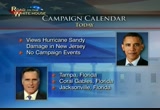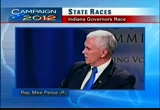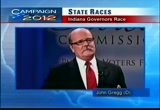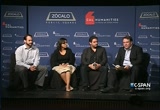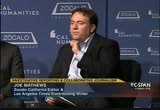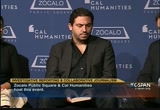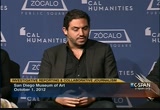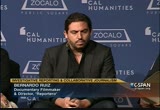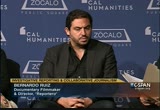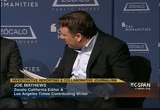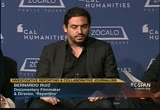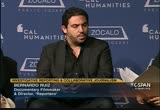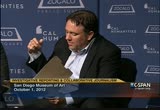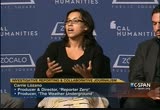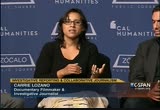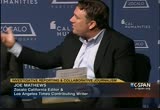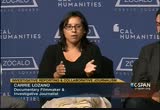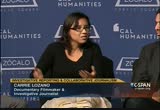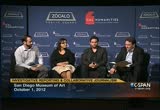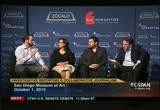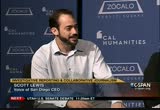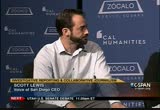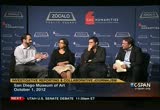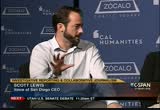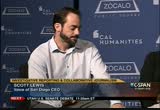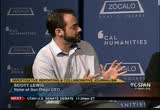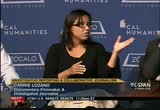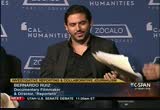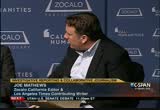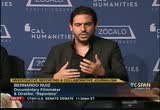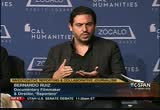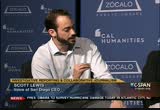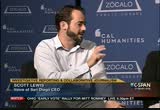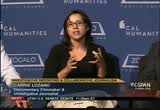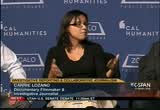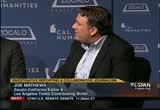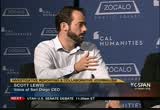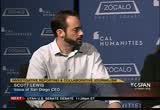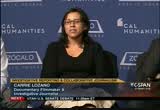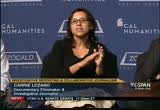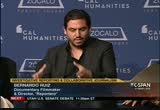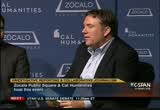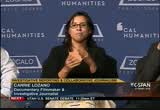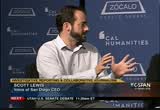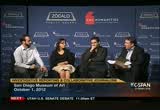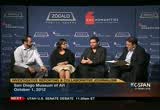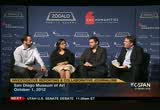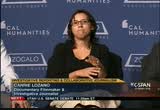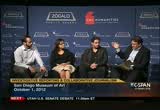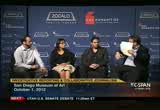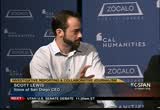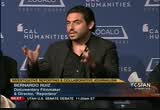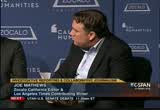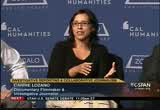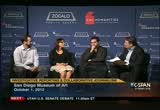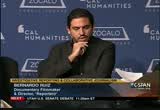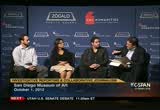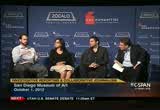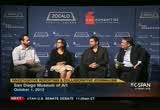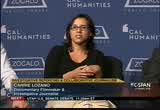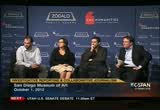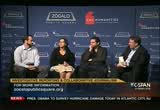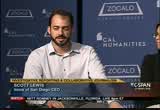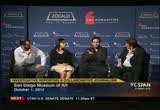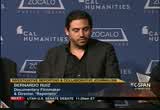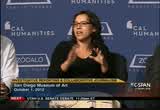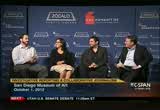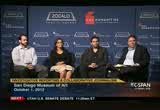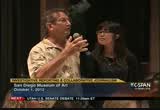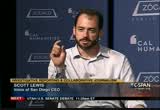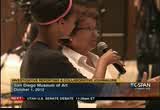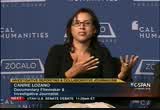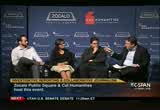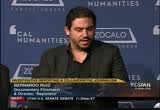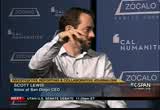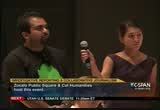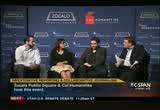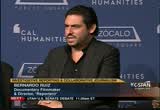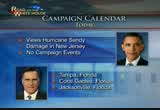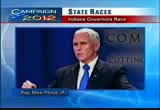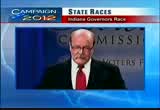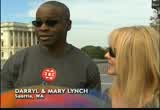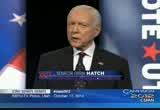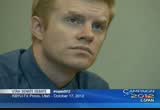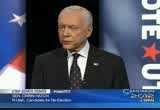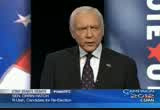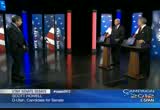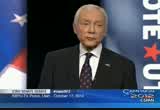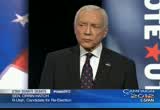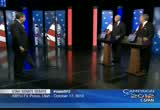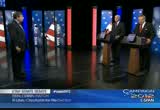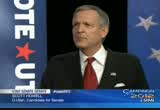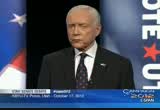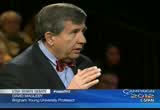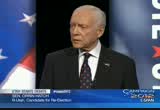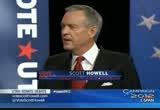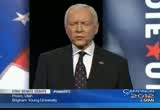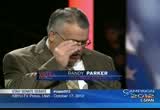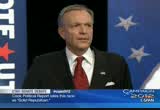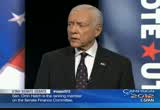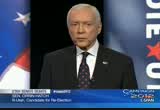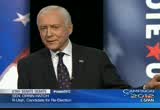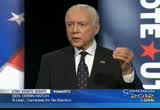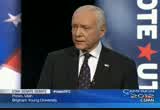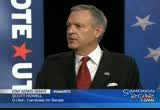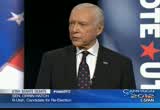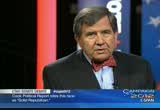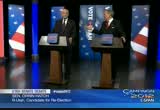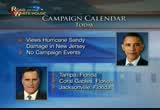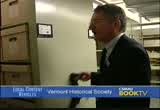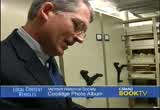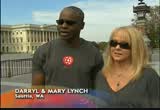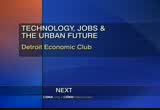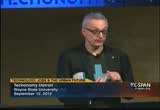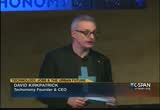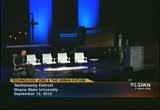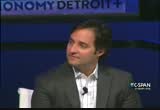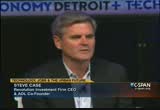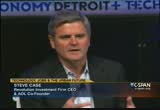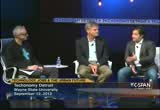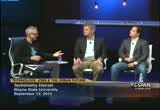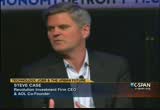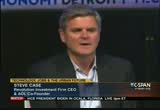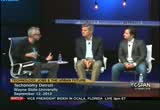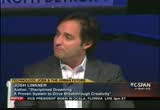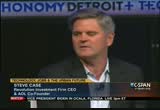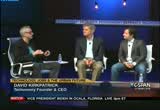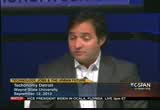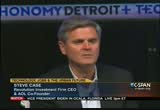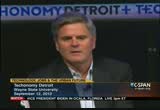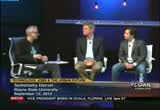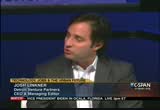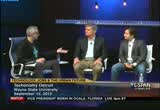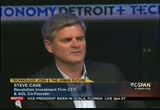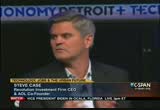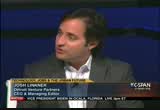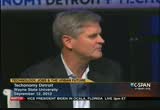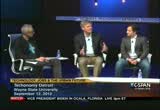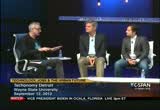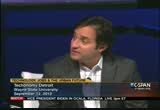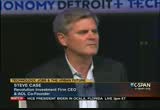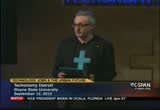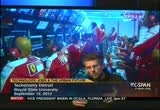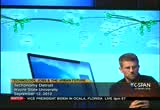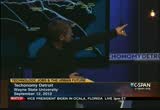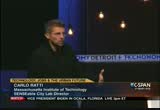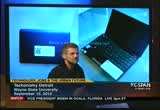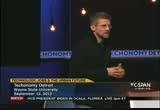tv Public Affairs CSPAN October 31, 2012 10:00am-1:00pm EDT
10:00 am
scuttled across florida today. competing with jeb bush, and marco rubio. c-span is road to the white house coverage heads to the battleground state of florida and ohio today with vice president joe biden campaigning in florida. on that florida -- republican n the governor are traveling across the state encouraging early voting. we will be live with their stop in the southwest part of ohio. tonight met romney campaigning with jeb bush at a rally in jacksonville florida live at 8:00 eastern on c-span. >> indiana has made incredible progress over the last eight years. we balanced budgets, become the fiscal and the of the country and now have the largest budget surplus we have ever had. it will make a possible for us to strengthen our budget reserves and i believe we can cut taxes for every resident.
10:01 am
use every paper things in indiana. when you are speaker of the house, for five of the six years, indiana ran deficits. came in, indiaaniels was $700 million in debt and a deficit of $700 million. i would like to know, from my colleagues on stage, how we will mature and preserve the fiscal integrity of indiana. >> if you spent the last 12 years in india and not congress you would know that our budget needs to be balanced. i have a balanced bipartisan a balanced budget. and the things you talked about were supported by david long, and lieutenant governor. find laughable that united states congressman would lecture anyone about fiscal responsibility.
10:02 am
you voted not once, not twice but five times congressman. you voted and the results in increased our deficit by 200 billion, billion with a b dollars. >> find a key house, senate and governor's races on the c-span, c-span radio and c- span.org/campaign 2012. >> a discussion on the current state and future of the news industry, focusing on investigative reporting and journalism practices. this event, hosted by zocalo public square, is an hour and 15 minutes. [applause] thank you all very much for being here tonight. thanks to cal humanities for making this possible.
10:03 am
the topic is inspired by the jefferson quote about the price of freedom and liberty. jefferson also said, reportedly said, given the choice between government and newspapers, without one or the other, he would have preferred to do with newspapers and without government. then he got elected and began to claim he was misquoted. from that, zocalo said big questions may lot of different perspectives. we have re-different people here -- three people here from different parts of the country, different backgrounds. they're all journalists. they are all people who have looked at a wide variety of topics in their work, and have among the topics they have looked at, are the media itself
10:04 am
and specifically questions about how we keep a check on power, keep a check on government. you will hear from all three of them. i will introduce each of them as i ask the questions. immediately to my right is bernardo ruiz. his most recent film "reportero," is an incredible film if you have not seen it, it follows a reporter at an embattled mexican news weekly reporting on organized crime and corrupt officials. the film was completed and toward mexico and the human rights watch film festival and will air january 7, 2013 on pbs. he also produced two documentaries examining the dropout crisis and is a previous director of "the american experience, roberto clemente," winner of an award for outstanding television documentary.
10:05 am
he has done a number of other things. the question is -- what does vigilance mean at this time of transition, how we get information by newspapers, the changes in reporting. what does it mean? what should it mean in this context? what does it mean particularly for the kinds of reporters that you have most recently made this film about who are covering very difficult stories where there is real risk involved? >> from my perspective, as a documentary filmmaker, i do not know i would consider myself a journalist in the traditional sense.
10:06 am
i think i have a slightly different set of challenges. a traditional journalist has to be factually accurate -- like that, but that is a point of departure to make something larger. i do not always get there. for me, vigilance is about depth. i made "reportero" about the staff and reporters there public, the co-director of the paper, and i wanted to make the film because so much of the u.s. cable coverage that i was seeing about the drug war, especially in this part of the country, to me seemed woefully decontextualized. it felt like rubbernecking body count journalism. x number of people were shot on the state. this person was be headed there, but no context.
10:07 am
no background, no history, the deepening of the story. i'm by no means a expert on mexico's drug war, but i did have a very strong interest in this region and in tijuana. i began researching in 2007 while looking for another story. unlike other journalists, who do not have the amount of time that you often need to tell the stories, when i was in production i had a little over two years to spend with the story. that is enough time to deepen your sense of a place, an institution, to gain trust and to hopefully have a deeper narrative. whether or not i succeeded or failed is up to the audience and the people who push back on
10:08 am
my perspective, but for me the ability to spend time with an issue, too deep and your understanding of that issue, provide the debt to audiences, that is key to take apart that issue of the audience -- of vigilance. >> to different pressures that are in no way similar, but speak to how hard is to be a professional reporter, a documentary filmmaker in these times. in your film you talk about a couple of different stories, a columnist, a court reporter, the founder, living on this side of the border to avoid danger. in a time when it is so hard to make a living doing this anywhere, are we asking too much of professional
10:09 am
journalists, do you think? >> that is a great question. i think the newspaper reporters that profiled in a "reportero" -- the lead reporter, they had very serious threats that force them to send his family away for a while. they would say, we are just regional reporters, doing our peace, cover and organized crime as we see it played out in this region. what u.s. reporters doing? i was speaking to a person who basically started one of latin america's first online news outlets, a fabulous online news outlet. he was saying is almost as if david copperfield were at the border when these suv is packed with methamphetamines and other
10:10 am
drugs and narcotics were funneled into the united states, as if they magically vanish when they hit the united states. who is doing reporting on the criminal distribution networks in united states, atlanta, dallas, los angeles -- who is doing that reporting here? so much attention is focused on what is happening in mexico, we are lamenting the strengths or weaknesses of reporting in mexico. the mexican reporters, especially the regional ones, were hardest hit. it is the once in these regional outlets like tijuana. they want to know who was telling the other side of the story and who is doing the money reporting, all these narco dollars. who is doing the story about
10:11 am
money laundering? i do not know if i answered your question, but that is certainly a kind of push back there. who is telling the big story and the small story? >> let me bring in carrie lozano to the conversation. she is a documentary filmmaker and journalist who has done a lot of work. her film "underground" appeared at sundance. also she is an emerging expert on the question of collaborative reporting, journalists, between news organizations and citizens -- she works in the investigative reporting for uc berkley and has co-founded collaboration central. very basic question -- who is doing this kind of reporting? you could say this about anything.
10:12 am
do existing american media have the resources, individual television stations, to do investigative reporting on the toughest stories? >> if my boss -- my boss, for any of you who have seen "insider," he is the insider, al pacino. he says investigative reporting is not non-profit, it is anti- profit. he is right. nobody ever had the resources to spend two years on a story. nobody knows this, but "the new york times" did not even have an investigative unit until the 1990's. even then it was just a couple of people. i do not want to say that
10:13 am
nothing has been done, because scott can tell this -- at the local level. the local watchdog is hurting around the country, but at the national level i do not know that a so much the case that we are not able to be vigilant anymore. i think vigilance is taking a different form. it is taking the form of more collaborative efforts, where people are working together to produce really in-depth stories that are hard hitting and take that watchdog role. it is happening in other mediums. a lot of documentary filmmaking is becoming investigative and there's more support and acknowledgment for that. if you look at the numbers over time, more newspapers do not exist, a lot of reporters have lost their jobs, that is true, you cannot deny it, but i went to the investigative reporting conference this year and there were 1500 people there, one of the largest turnouts ever. people are still doing work, doing it in different ways.
10:14 am
the money is always hard to come by. it may be harder, but we also have wider means of distribution. it is hard to say -- there is no clear cost-benefit analysis of was a better then than now. i am not 100% convinced. i think it is different now. >> i worked in three newsrooms -- "the baltimore sun," "the wall street journal," and "the los angeles times." i worked with many brilliant people, but plan well with others was not a strength of the people i worked with across any of those. it very difficult folks. they had a hard time collaborating and getting along with the person sitting next to them in the news room. my old boss from "the los angeles times," he called the collaborative effort a pain in the a.
10:15 am
tell me what one of these things looks like. explain what happens -- how do they get along? do they get along? >> for those of you who have not worked in a newsroom before, journalists and organizations are incredibly competitive. even today, in your contract, you are signing confidentiality agreements. you will not talk about your story. a story -- i do not know if it has been true -- they used to assign reporters the same story to two reporters to see who does the better job. there is a huge cultural issue here. what is happening because of diminished resources is news organizations are starting to say, i cannot do that kind of work on my own. i will start to work with other technically competing news organizations. i have been involved mostly in
10:16 am
large-scale collaborations that involve pbs frontline, propublica, we are doing something with univision and the center for investigative reporting. it may seem like a no-brainer -- it kind of is, and especially today, but culturally is against the norm. we received at uc berkeley a grant a couple of years ago from the knight foundation -- they asked us to do a how-to model for collaborative reporting. we quickly realized that before we can teach people to do this, we need to change their mind. we need to change the culture in some way or start to talk about the culture. do they always play well with others? no, not always. the thing i say every conferences i think that in the news industry we need to put a lot more effort into teaching and team work in a way other businesses do and teaching leadership. it is good leadership and teamwork skills, the
10:17 am
acknowledgment of that -- reporters can do a job they feel good about. >> there is not enough money. everybody -- the audience is too fractured? >> it is both. for frontline, the executive producers there felt they do not have investigative reporters on staff, they cannot afford it. they want to have the most cutting edge investigative stories on the air. the way they do that is to work with other organizations who are doing investigative work. they are not broadcast organizations necessarily. it is about the money and it is also about the fractured audience. one thing that we realized when we worked on a series with propublica, front line, and npr -- when you have a and your store with 25 million listeners more people watch the broadcast. it is finding different audiences. >> thank you very much. let's bring in scott lewis, ceo of the "voice of san diego." he manages the internal operations for the organization. he has traded partnerships and projects.
10:18 am
he is a regular on tv and radio, host of "san diego fact check" here, has a weekly radio show, et cetera. you are serial collaborator. your staff has 10 people. what kind of vigilance void can you fill with partnerships and you are young, hungry, a talented staff? >> i would like to map what we are not doing. areas of geography, institutions that are not being covered and why. holding a mirror up to somebody -- just by showing people that you are watching, there is a positive effect. our goal is to cover things as
10:19 am
best we can. that means we cannot repeat or be redundant to anybody else's work. jeff jarvis says "you do what you do best, and you link to the rest." we find stories we can really be the best that and frame and explained. and then let other people do what they do best. and accentuate that and try to help that. when we look at partnerships, we look at -- we look at a world where the producers of content, the drivers of explhaveioo be tied to the means of distribution, a broadcaster re printing press or whatever.
10:20 am
the idea that you can have the means of production and distribution in the thing that comes up with the storytelling is i think an old one based on the newspaper having a printing press in its building. we have decided we can be the agency that supports public radio, commercial radio, magazines, tv, and we can all work together to get the best stories possible. we are switching also to not necessarily covering beats but covering narrative's. rather than just putting one person on education to try to gobble that entire fire hose that comes at them, they can add narratives and subtract them, make sure people are involved. if they are not enrolled in those narratives, something will play out without their impact.
10:21 am
>> a follow-up question -- i am not thinking of any city in particular here. with that kind of operation, let's say you have that operation in a city where the daily newspaper in town started to do some very strange things. i imagine that. it was owned by somebody who was very openly talking they were going to support particular causes, particular developments, particular parties. i imagine something like that could happen. does that add to the obligation of citizens, people like you, to do more to fill that void? or can you still fill the void -- is that city just out of luck? >> first of all, it is a remarkable symbol of what is happening to journalism. locally, the owners of the "union tribune" just purchased the "north county times" -- the
10:22 am
assets are collapsing in value. they bought it for $12 million, sold his house for $18 million. putting aside that, these properties can be acquired and done with resume. this is not an expensive problem defects. i think that is an important -- an expensive problem to fix. i think that is an important thing to remember. i have a budget of a little more than $1 million, which is a lot for a person like me. for a cultural institution for an impact with the entire city, that is not that much. museums are run on a higher budget. university colleges, professors in universities are on a bigger budget. the point is that if we want to solve this and realize we want to have more coverage, there
10:23 am
are ways to do that. we have setup a society that knows how to find institutions with that kind of impact. the "texas tribune," we inspired them -- now they inspire us with their ideas and structure. >> they are treated from people from a "texas monthly magazine" wanted to focus on local politics? >> we were featured on the front page of the "new york times" after investigations we did. they told us, what can we do here? they decided they wanted to do an entity in austen that covers politics relevant to the entire state. now they are running on a $5 million budget. we are all gawking at that. that is a lot of money for the -- not a lot of money for the type of impact that institution can have. with the vance, corporate and member sponsors, you can do some impressive things. we are trying to look at this is a problem to solve.
10:24 am
do not cover anything unless you can do better than anybody else or nobody is doing it. makes sense of what people say, a fact check it, but find out what they do not want to say as well. applying those types of metrics to the stories and narratives you will cover can make it so that you are leveraging a small amount of resources a lot better than perhaps the old model. >> for the whole panel -- you mentioned, bernardo, a story here, a big story here. what are we missing when we do the things we can with the resources we can -- what are the holes opening up where we are not being vigilant? >> it is geographic and qualitative. there are areas or not covering, institutions. people appreciate investigative journalism when it has its impact, but when it is not around to do not know what you are missing, unnecessarily.
10:25 am
we do not know what we do not know. i think that is an important problem. >> we look for stories where literally is not work being done. one of the big stories last year was about an investigation in america. you may hear about a murder investigation in a nearby city and it might seem flawed, but that is the end of it. this came from a long trail of reporting done by many different people. we started to just get a sense that -- we did not have a sense of what the country looked like. we started to learn there were no rules for what it meant to be a coroner -- you did not have to be a doctor or trained in some cities. there is an anecdote that somebody was also the janitor as well as the coroner.
10:26 am
we are looking for tips where there is a story in front of you, the local murder investigation, but what is behind that? that is what we are always doing, trying to look at an issue that may be all around us but nobody has found a really particular angle. we are lucky because we have the capacity to do national stories and try to get different organizations involved to look at something on a national scale. >> bringing back to that -- as a documentary filmmaker, i manage a small company, we are four people -- when you commit to a story, you had better know that you are going to do a good job. once you go down that rabbit hole, you are talking about a couple of years. for me, the criteria is, take a narrative out there that is well known and find a back story.
10:27 am
i think about the story -- >> the legendary columnist. >> exactly, who when kennedy was being buried was looking for an angle on how to tell the story and ended up doing a beautiful piece, interviewing the grave digger. telling the story of kennedy's death through the point of view of this grave digger. how do you talk about the drug war and u.s. links to the drug war, this thing that is so impossible -- you have to root it in a specific story and find some kind of back door, some kind of different way to do it. for me that is always an important piece of the puzzle. >> to look at another aspect of this -- a lot of citizens are doing journalistic things with their cameras all over the world. i found myself thinking as i was watching about everyone, folks
10:28 am
in syria and homs, they show what they could, to folks here in oakland with camera phones trying to show police misbehaving. somebody, the act of journalism, how to protect people, whether they are citizens or professionals -- what do you think? we do not have a conversation about that. should there be an international standard of journalistic rights, if you are committing journalism you should be protected? how you protect those folks? >> good luck implementing that law. is a great question. something journalists and tijuana struggle with all the time with the rise of social media and websites a lot of you have heard about -- including one which started out as a compendium of information about
10:29 am
basically narco turf wars, shootings in the streets, the headings. it started off as a visual wallpaper and has since become interesting, more sophisticated, and is beginning to write articles and put -- and the editor is anonymous, but they are beginning to publish pieces. this thing that was touted early on as being a kind of innovative or new information delivery system is now turning into a more traditional journalistic entity. the journalist would say, that is great that the information is there, and the kind of iphone video or man on the street, so called man on the street video of any event can be uploaded quickly, but who is providing context and analysis?
10:30 am
not that we always need to rely on experts, but if you are writing for a weekly, that really gives you a totally different approach. you can provide context, provide perspective, in a way that you do not necessarily get from that immediate delivery of information, of data. >> in collaborative work, to what extent are using stuff that comes in from citizens? to what extent are you putting data and other things out that citizens can then put the pieces together? how much of that do you do? what is its value? what does not work about it? >> we do not have a magic formula, we do not have the type of investment you can make controls the other people do. it is important to remember that journalists always put out a story knowing that the response is more valuable than the story they put out.
10:31 am
to see what the truth is. we are just entering a very exciting phase. with this disruption, there has been a lot of different efforts to change the role of journalism -- not just to classify the job, but also to organize information better. one of the roles journalists never picked up the way they should have and we are trying to explore more is their educational role. you can do investigative journalism, but the idea that people understand everything journalists talk about or read about in their story these days is really something we need to examine. they are not following the story is very well. it is not their fault. stories are not being told fully. they are not being brought to speed. the number of people who know how school board elections work or how different aspect of our community actually function before they can even get enrolled in a story about how they are developing is something journalists need to take stock in and step back from. this formula is being applied to stories, reader's digest, stuff
10:32 am
like that, that help people. >> the citizen question -- >> we are not an outlet. we are a program at the university of california, a graduate program that does reporting, but we are working with different organizations. we do not really have an initiative, per said, but there are organizations that are doing incredible work with citizens. "the guardian" in the u.k. is the best example of a large organization that works with citizens on a huge scale. one of the things they did in the last couple years was pulled from public records about the way their politicians are spending money. millions of documents. they created a form and citizens volunteered to go through those millions of documents and competed. it was amazingly successful. i do not know how many thousands of people participated, but it
10:33 am
was a lot. "the guardian" is very innovative. american journalists are trying to find ways to do this -- to engage citizens. we do not get a lot of cold calls or tips, but we never ignore. i do not know if there are journalists out there -- we never ignore a tip. i do not care how crazy it seems, how far-fetched -- we always follow up. you will be surprised at how many amazing stories we get out of thosetips . on that way, we deal with people in serious ways. when we do large-scale investigations, one of the things we try to do is make information available for other reporters. we treated maps that showed in each county or state level, it is different at the county level, how investigations work, what journalists need to report. trying to share as much information as we can so that
10:34 am
other reporters can take what we have done and carry it forward. >> talking about educational -- i could not help but think of the internal revenue service when he started talking about education. you are collaborating with nonprofits. bernardo ruiz productions -- >> not a non-profit, but primarily public funders, foundations. >> so you are non-profit, you have money from foundations, they have agendas. the second problem, the irs seems to not buy in many cases, they do not buy the notion that non-profit journalistic enterprises are educational things.
10:35 am
how do you wrestle with both of those? >> there is a discomfort with the idea that newspapers are not going to be ok. the idea that it needs to be a public service type entity that take that role is still something they are getting accustomed to. there is movement in a positive -- >> these are old irs agents that are holding back? >> i do not know. the point being, what i'm trying to address is that there is a role, there is a gap between when you leave school, even college, and civic engagement, being able to run for office. what that knowledge -- how you learn all the things about how your community works? there is a gap, and we have no organized system for how to get you to that point other than for
10:36 am
you to individually look at your students' school or a stop sign not in place, then you start getting engaged. that is why i think our type of organization can increase that educational role and do more of what we are doing at the investigative and vigilance. >> have you had a hard time? >> we were one of the first. maybe they started to dial back the more controversial organizations. it has done quite well. we never had trouble. it is important to note that the members who watched support it. it is not a question when they make that decision -- people are wondering when people support journalism, these newspapers fall apart and people say people are not willing to pay for journalism. >> they never ask, please, help us? >> it just stopped.
10:37 am
it just stood there like a depressing time capsule for months -- it drove me nuts. these entities are falling apart without ever wondering what their community would support. frankly, a nonprofit is a much better situation to make that plea to the community because a for-profit is set up for shareholder values where receiving money as gifts is awkward. we see it in different newsrooms around the country. >> you are more sympathetic? >> i am saying the mission-based organization is a more sympathetic organization to support. >> when you reported on some of these that are foundation- funded, had he seen examples of the founder trying to meddle? >> yes, but it is a meddling in
10:38 am
a particular way. very few foundations exist solely to support journalism -- there are a few, but there are not many. there are thousands of foundations with in this country, and they have very specific desires and goals and impacts in mind. it might be to better their community, to better the arts. a host of things. when i say nettling, it is that sometimes they will give a news organization money with a very specific scope in mind. i am making this up to be fair, but maybe they want you to just cover education. that could be great, but maybe what you really need to cover something else in that community, but suddenly you have a check in front of you and you feel compelled to cover education. that is the type of thing we are seeing here and there, but
10:39 am
that overall is kind of concern. i think it could be that foundations could be educated about journalism. i went to a big foundation conference and realize they do not necessarily understand the ethos of journalism. that goes against the ethos of journalism to tell them what they should cover. i think it had a conversation, but it will take time and effort. >> for money to make films? how tough it out there? is there money for vigilance? >> on the documentary side, it is most of the time, as documentarians, we are what would be considered enterprise journalism. we subsidize our development and by the time we have something to show or the sense of a pitts we are going to foundations. typically we are going to places where we think these projects would be well received. i am also sometimes commissioned by entities. i am working on an education serious, and that as a commission from the corporation for public broadcasting.
10:40 am
the mandate is very clear. i have been very lucky in that the foundations that have supported my work -- in "reportero" we had quite a bit of support in the ford foundation. there was no editorial meddling and no restrictions on we should and should not be talking about. >> another aspect -- the standing army of journalists has declined and been given their honorable or not so honorable discharges. particularly in the last decade. they have gone to all kinds of institutions -- i keep finding old colleagues are people i knew who argue in journalism from in a different kind of place. they will tell me that, at least. government is one -- you started in government. you were the inspector general of health and human services. the legislative leadership in
10:41 am
california hired a bunch of journalists out of the press corps to put them in office -- they figure out stories that have not gotten a lot of attention. there are reporters working in l.a. county for the board of supervisors -- they have journalistic blogs or even internally. does that have value? can the government be doing this? can you be doing journalism from within government? >> no. i do not think you can be doing journalism from within government. the inspector general is supposed to be apolitical, and that was not totally the case, to be totally frank. i do not know what it is like now, but when i worked there during the clinton administration it was absolutely not apolitical.
10:42 am
people make decisions about what it will find, what you will do. i was told that during the bush administration the oig would write reports. that are be completely redlined and turned into a one page memo if it did not fall on certain lines. so i do not think that as possible. >> let me disagree a little bit. maybe not vigilance, but with resources in our world, all these complaints about not covering the good news, different types of news that come from different types of entities can be reapportioned to other needs. at mayor's office, they had 1.3 of some of the best former writers in town, former journalists. they could have produced a voice of the mayor's office that was interesting to read, that i would have read.
10:43 am
is that government propaganda? of course it is. but on the other hand, n look, nfl.com is doing. they run columns and interesting conflict-type stories. resources are going direct. in a world of dwindling resources, those resources are used for vigilance and to make sense of what they are saying. put it into context and find out things they do not want to say, but perhaps we can drop the complaint that we are not covering good news and let them cover their own good news. >> that is a good point. >> what about the ngo? human-rights what has won a journalistic awards for its work -- human rights watch has won a journalistic awards for its works. in the los angeles area, the best investigative reporter now does investigative reporting
10:44 am
paid for by the service employees international union local. what about that sort of thing? taken with a grain of salt, is that part of the answer? >> in a world where anyone can buy a newspaper for $12 million, we are close to everyone being pretty open -- newspapers are trying to do -- if a non-governmental organization produces a product that is transparent about things like that -- people can put it together and do in narrative you can understand. >> what do you think? >> i was just going to say, as long as these projects are explicit about where support is
10:45 am
coming from, are up front about it, at least you are giving a fighting chance. interestingly, a lot of commercial organizations are not explicit or honest about where their support is coming from. in some ways, we are holding the ngo's and nonprofits to a higher degree of scrutiny. >> you get credibility based on the the algorithm you are using to find your information, how transparent you are. it used to be that a young person like jason blair could work for "the new york times" and would have credibility. i think we're changing to a world where an organization has to be open and show how it goes about its business, what its plan is, what it is trying to do, and let the reader -- >> what about the academy? what about universities as a home for this?
10:46 am
full disclosure -- one of zocalo's most important partners is arizona state university. you work in the academy, doing investigative journalism. is that a natural home, with academic freedom, or does that have drawbacks and problems that are not immediately apparent? >> i am sure it does. i think it depends on the institution. there is the idea out in the journalism world that we can all become like teaching hospitals. universities can become teaching schools for journalism and put real information out into the world. i think it depends each year for us. some years we have an amazing group of students who are very engaged. as with anything, you might get a year with that is not the case. there are ups and downs, but
10:47 am
there are more pros than cons , at least for us. being at a academic institution has tremendous benefits -- insurance, the university pays the rent. there are many benefits, but it is definitely a different way of working and involves a lot of time and mentor ship beyond actual reporting and a different type of fund raising, too. >> have either of you collaborated with universities in any of your work? >> i have not had success with it yet. that does not mean we could not figure it out. >> there is a project we worked on -- one of our bigger investigations was done with claremont-mckenna about food stamp distribution in san diego county compared to other counties in california. they helped us with the data for that. there are ways with specific projects. >> i hear more about that, and a
10:48 am
partner of zocalo, the lane center of stanford, has a spatial history lab. that has allowed journalists to do more with data, deeper data mining. the journalist is almost the translator of what comes out of the data. is that sort of the great potential in that? they have computers and -- >> a partnership always works best when both partners realize they cannot do something. when the journalist realizes they have a problem they can solve if only they had a camera or data or geography, then they can do anything. but it is very important that both partners realize they cannot do what the other partner can not. >> if journalists have always been conveeners, they find people, translate experts -- do we get, the army puts the work through the boot camp.
10:49 am
you get to the point you have to train experts and people on how to do journalism? that is the next thing -- the journalists, it will be like early vietnam, folks come in to train the citizen or the expert, essentially? we are on a training mission? >> an exciting front will be a version where the prosecutors become journalists, and military experts become journalists. the idea that journalism school just produces journalism, there is probably a role for storytelling as a profession. i am really excited to see some become experts and polling and finance writing and stuff like that. i am excited to see that at the local level, and if we could ever afford some real
10:50 am
accountants to investigate facebook and stuff like that, we would know how to write. that would be an expensive purchase. >> i am not worried about good storytellers. i think that is a really exciting idea. one of the things that allows me to sleep at night is when you spend a lifetime working on being a storyteller, i may not be an expert but i am smart enough to know when i do not know something and talk to someone in that particular field. something like planet money is a great example. it is an hour of reading radio about hard economic concepts and they do precisely what you
10:51 am
have been talking about where you take something incredibly complex and you boil it down in a way that makes sense. it is all told through the power of narrative. i am feel like i am not an expert and will fully on agitated about vast pieces of american life. as a storyteller, i understand i need to go here and put those pieces together. >> i wanted to follow up on something you referenced, the notion of the journalism school, teaching. you are seeing more journalism schools asking, a bunch of foundations getting together recently who wrote a letter that you are not supposed to use in newspaper leads, slamming journalism universities for not using that model. what are journalism schools producing? part of me wonders, is part of what is going on we are trying
10:52 am
to keep labor costs low -- those are people who do not need to pay, but they are paying you for the privilege of doing the work. >> this is completely my opinion. i think the world is changing so much faster than academia is accustomed to. journalism, even just a few years ago, we would not be having this conversation. we will be having the death of the newspaper conversation. we had that for five or six years. i feel like things change so quickly. the technology has changed things so rapidly that i think academia has a hard time keeping up and knowing what to tell young journalists to do. i am reading a slew of our lists saying, i want specialist's again. that is partly what is
10:53 am
happening. the world is moving at such a rapid pace. >> we have a switch that with such a robust media industry for so long, the goal of academia as it applies to media was to protect quality and talk about best practices. whither the death of the media industry, and it is the death, the role has to switch to innovation to figuring out how to protect those values and other things we care about. that itself has to have some element of innovation and creativity. it cannot just be about best practices, these great stories we wrote, that sort of thing. >> if you want to become a documentary filmmaker, where do you learn how to do that? where do you go train? do you pick up your camera?
10:54 am
what advice do you give to someone who says i want to be like bernardo ruiz. >> the scared straight documentary, the ex-con goes to talk to a kid. i sometimes feel like i go to documentary talks and give that lecture. i go to a new program, a social documentary program, a two-year program in new york. there are two routes. one i took like running away to join a circus. a minor league ball player. you train with people who are really good at what they do. >> to train you? >> i was lucky enough to work for a couple great filmmakers. i worked for orlando bagwell for a few years.
10:55 am
a pbs series. he had come out on a series looking on civil-rights issues in america. that was a fundamental place for me to learn. i also worked on a documentary series for a long time. i learned by working in production and by immediately working on things of my own. i do think there is a benefit to the best practices, the thing that happens in an institution where you are not just struggling to make the thing. you are talking about it and you also have community and resources. if you can afford it, that is a powerful route. i happened to learn the hardest way possible, which is by working in production and not doing anything else. >> is that an issue here, the kind of methods, the
10:56 am
institutions and the pattern and career that allows people to be trained to do watch-dog type stuff, whether they are journalists or do similar things, are those drying up? >> documentary films are interesting. in some ways, that still exists. in journalism, the apprenticeship model the newspaper used to offer is definitely going away. you have a staff of 10 and you might be able to mentor some number. it used to be the copy boy or girl. you really could not rise through the ranks. i do not want to put a quality judgment on that. everything is different. >> it brings up possibilities for other people to a rise that would not happen. >> exactly. >> where is your summer
10:57 am
internship? all that. >> it is a defined path. i was in the path and watched its struggle. that was difficult. it offered opportunities. >> it used to be, when there were not so many institutions, the bigger, more diverse array of things, where people wonder who is a journalist anymore, it seemed like there was a stronger, commonly, publicly known ethics of what a journalist was supposed to be and how to behave. should there be a training of what a journalist should be? >> they always talk about rules and ethics. the broader public, they never
10:58 am
took the time to actually narrate that and enroll the public in their own narratives. people knew the editorials were separate from the newspaper. but there is nothing very stark in the actual paper explaining that every day. we just assume we do a story three months ago, we assume they read it. this is a problem in our industry. one thing's these new industries have to do is enroll people in the high standards they have, talked about constantly why they should be trusted. it is a constant enrollment. >> i want to say one thing i feel like has been lost is, while there has been more room for new voices and more innovative voices, by the time the newspaper's collapse, most of them had made a strong commitment to diversity. that still exists in some of those newsrooms.
10:59 am
you see the nonprofits come up, for reasons that are mere survival, they are not there at that point. we are losing a lot of diversity in our journalism. that is one very big red flag i feel strongly about, figuring out how to support these nonprofits in those goals. >> when a newspaper was an institution you could complain to, that was a way to solve the problem. with the institution falling apart, you have to solve the problem itself. >> some people do it and have made real commitments. some organizations do not. >> let's open it up to the audience. >> thank you. it is time to take questions. there are two people with microphones. jennifer and i will take your questions. please speak into the microphone. we are recording and c-span is here. the first question is right here. >> i am looking at a state of
11:00 am
open mind, a public square, >> i am looking at a state of open mind, a public square, all these terms you use. the name that comes to mind is wikileaks. do you support the work? is this something you will support in the future? i find journalists do not ask good questions. it is very frustrating. we are not getting the truth, no transparency. what is your opinion of the work of leaks? -- of julian assange and the work of wikileaks? >> we have had a guest for a couple years, both on skype and in person. -- we have had julian assange as
11:01 am
a guest for a couple of years, both on skype and in person. that is a complicated issue for many reasons. one of the problems is it is hard to parsecs the figure from -- it is hard to parse julian assange, the figure, from what he is actually doing. i do not have a clear answer to that. in a lot of ways, i support what he was trying to do. i do not know if i support it in the way he did it. most journalists believe in the public access of information. that is why we do what we do. he is an interesting figure. it makes things very complicated, at least for me. >> i support and defend his right to do what they did. there is some discomfort with his personality, his figure. i think this is an example of another formula being applied to the journalism problem. i think homicide watch in
11:02 am
washington d.c. is another one. instead of everything having to go through a story on the front page, this is a way to apply formula to solving a problem. which is to take a bunch of documents and get them into the hands of the crowds and see what we can figure out. it is interesting to watch and i defend his right to do what he did. there are questions with regard to how he did it. >> i was wondering if there was more to the question. the professional norms and ethics, there are certain things you cannot do and places you cannot go. julian assange does not have to play that game. james o'keefe,the conservative who dresses up, do you think it is valuable to have those people? this era gives those people a reach. there are certain things the rest of us cannot do. they almost do anything. >> absolutely. it is a great question.
11:03 am
is he a journalist? is he a hacker? is he just someone who is responsible for massive data dumps? i personally have a slightly more conservative take on what a journalist can and should do. i would prefer to have a trusted force that can synthesize some -- source that can synthesize some of that information for me. someone i can follow over a period of time. over time, that writer gains credibility for me. somebody i respect over time. then again, you have to ask yourself, did it have an impact? did the act of releasingall that information at different times, did it have an impact? it did have a huge impact. we are having a conversation about ethics and standards that, to some people, feels old fashioned.
11:04 am
in some ways, the journalism that is being practiced harkens back to an old school investigative print journalism. not that i was being romantic, but i wanted to still see it in practice. >> as documentary filmmakers, have you ever gone undercover? >> no. >> i have always had to be upfront. someone can do would you in two seconds. -- can google you in two seconds. asked. someone gets a response a journalist knows is not true and they are not responding in a way that is not satisfactory.
11:05 am
i want to empathize with that feeling. i do not know how to solve that issue. >> hello. i used to be a journalist a couple years ago. i have not seen your documentary. i am very interested in seeing it. i am out of the journalism business. i have a startup. what we are doing is working on the video medium for overall video use. especially information-based communities. it is growing exponentially worldwide. i want to ask you, where do you see journalism in 2020? where would you like it to be?
11:06 am
>> everybody is waiting for what is next, what is the new reality. the new reality is constant evolution. to the point where what we see in 2020 is incomprehensible. that is scary and hard. unless you try to take control and build something like you are talking about, i do not know. i do not think anybody who says they do has any clue. it will be good. every time there is a new -- there is an amazing talk. they just posted it on ted. every time there is a new printing press or something, everyone thinks it is the end of the world or it will all bring perfect peace and harmony. it does neither. it makes things better in a lot of ways and it makes things worse in a lot of ways. we will watch it get better and
11:07 am
worse. >> the question on your right. >> hello. i came tonight because i think not only are the questions not being asked -- what? i am getting to it. if you do not have a facebook account, you cannot comment on a story, if it allows comments. what we am faced with is a bunch of sound bites on stories and we are supposed to read that. in my point of view, we have to see people like walter cronkite, edward r. murrow, real reporters, what we are seeing now is a place to go to news that is imposed. -- huffington post. they got bought out, and now twitter is the big thing. there will be something else when twitter gets bought out. nobody in san diego is even talking about it. how do you see san diego
11:08 am
responding to the big stories, like the $1.2 billion grabber of money? edison, do not touch that. it's real scary. >> that is fair. we did a poll in a magazine. you could not comment on the posts in the past, but now you do have an interaction with reporters that is exciting. but you are right. we need better, stronger, more interesting coverage of these institutions, of these big changes, and of these scandals. you cannot pick and choose in outrage. twitter is not delivering the information. twitter is the source of like me and others who are providing a
11:09 am
way to organize that information differently. do not think of it as 140 characters as information. think of it as 140 characters to invite people to get deeper into a subjects. every tweet has a link. it is a very special medium that is allowing people to connect and share information extremely well. it spreads a lot faster than it would have in the past. >> question to your left. >> hello. i am curious what you think occupy wall street's tactics have changed media about inequality, income distribution, and they talked to people about how to document what was happening. training psittacine journalists -- train citizen journalists how to videotape police, and we have tremendous problems with police breaking up the occupied demonstrations in san diego. it was overwhelmed by a lot of other things coming up.
11:10 am
we do not have a physical place to camp out. i am curious how you think about how occupy has influenced the process? >> i think it had a huge impact. if you look at the election right now, the way we discussed so many things, it has become a part of all of our vernacular. similarly to not being able to comment, 30 years ago, that would not have been the exact same case. we had an enormous impact. it shows what an exciting time it is. to me, that is community activism. that is not journalism. they may have trained people to use journalistic techniques, and there is some reporting that happens, but i think we are at a moment where we are asking ourselves, is journalism something that is unbiased, showing what is happening, verses have a point of view. i still make a distinction. i do both.
11:11 am
the weather underground does not have an opinion on some level. but i do -- i feel there is still a distinction. it is just now that people have the opportunity to have a voice. >> i am excited to see what groups of filmmakers are going to tell the occupy story. it remains to be seen what impact they have had. they certainly impact the conversation. in 2012, we are still not talking about income inequality and poverty and structural inequality in deeper and more profound ways. that is not occupy's failure. it is something we still struggle with.
11:12 am
>> to follow up with that, they had something that i wish i had. they had a volunteer lawyers to help. there is all the fighting going on. journalists have cameras they take with them. there is fighting about what you can and cannot shoot. do you work with a lawyer when you are out there? do you have a lawyer you consult with often? >> that is the reality of being a documentary filmmaker. people, rightly so, are so much more sophisticated. because of things like reality television, people are much more aware of media and in some ways more comfortable with it. is ubiquitous, but at the same time,there is a sense of opportunity sometimes. it is a necessary -- i will not call it a necessary evil.
11:13 am
i like my attorney. it is a part of that puzzle. occupy is a social movement. i personally think it is an important one. i would agree i do not necessarily see what occupy is doing as journalism -- it is a kind of social vigilance. i do not see them as journalists. i am looking at independent sources to provoke and tell stories in a different ways. >> when i look at occupy, it is not an example of citizen journalism as much as an example of what a group of citizens can do to influence journalism. there is always this mentality that the media is doing its thing and it drives the narrative. to some extent, it does that. there have always been really good pr people have formed that
11:14 am
narrative. occupy has an interesting discussion. it showed how that could impact the narrative as well. >> we have time for one last question. i would like to thank our sponsors and our hosts, and c- span for being here recording tonight's event. thank you so much. the reception will be right outside the door and immediately following the last question. thank you for being here. >> i like a model for being transparent, exposing your methods. what would you do or say to somebody who has never written but wants to be a vigilante? what motivates somebody to be a vigilante? the follow up is the craft of reporting, as you were saying, that getting lost. >> vigilante. you mean the one person that wants to go out and chemical
11:15 am
journalism and hold their government accountable? >> exactly. >> you need to start. we all started somewhere. you have to start telling a story and see if you can get into networks that support you. >> i am talking about motivation, the logical motivation for somebody to do that. >> you never write as well as when you are mad. you have to read it after you do that. [laughter] it seems to flow. find out what's meant -- what makes you passionate. to tap into that, whether it is mismanagement, or something greater about society, tap into something that fires you up and do the work to make a good case about it. lawyers do the same thing. it is a process that being effective at making a case. >> what motivates you?
11:16 am
is it the usual thing, unhappy childhood? [laughter] >> good question. the storytelling takes a lot of different forms. i always think of myself first and foremost as a storyteller. you have a goal of having an impact. it is a sense of civic duty, what ever is. one thing i will say about all of us, investigative reporters are obsessive people and they are very curious. it is the case for most of the people i know. you see a problem and you just cannot let go. a real obsessive curiosity about the way the world works and hopefully trying to make it work a little bit better. >> for me, i would very much agree.
11:17 am
but it is also trying to get at what makes people tick and not understanding myself how institutions work sometimes and really trying to ask those questions and figure out those questions. i think "the wire" did a masterful job telling a story about the inner city, baltimore, the drug war. it is not a piece of journalism, yet, it is so informed by a long and interesting career in journalism, local journalism, that something like that, to me, has tremendous power. narrative is the way we absorb information. at this moment in time, for me, when i see those projects that can impact culture and the frame how we think about something, that is what gets me excited. those are the types of things i
11:18 am
throw myself toward. >> i remember on the college paper, a big deal reporter at politico, he liked to go through the trash of the board of overseers at the university after they had their meetings. he wanted me to come along. the fact there was something you could do for a living that had even a tiny bit of respect to run their involved diving through people's trash seemed so interesting. and attractive in its own way. is the dumpster diving over? >> there are a lot of locks on dumpsters. >> that is too bad. please join me in thanking everyone. we will see you at the reception. [applause] [captioning performed by national captioning institute] [captions copyright national cable satellite corp. 2012] >> with congress out of town,
11:19 am
the supreme court will be hearing a couple of cases. this involves the fourth amendment and whether any indication of a drug sniffing dog is probable cause for a surge. on the candidates scheduled to become the president continuing to keep the campaign on hold, at least for today. he visited the fema offices in washington and a world apart shortly from a meeting with new jersey governor chris christie over the effects of hurricane sandy in atlantic city. also, transportation secretary ray lahood saying that his department is providing millions to states. there will be stops in wisconsin, las vegas, and colorado for the president tomorrow. mitt romney, three stops today in florida. an appearance at 8:00 p.m.
11:20 am
eastern live at c-span. and florida, joe biden espy campaign just after -- is a campaign just after 3:00 p.m. eastern. casey -- casejohn id is encouraging -- gov. john k. sacha is encouraging early voting. >> we have made incredible progress in the last eight years. we have balanced budgets in all those years and have become the fiscal n.v. of the country and have the largest budget surplus in ever in our history. i believe we can cut taxes for every hoosier. but john, you just said that we pay for things in indiana. when you were speaker of the house, for five of the six years that you were running the state house, indiana ran deficits.
11:21 am
when ms. daniels' came into power just a couple years later on budgets that you helped to write, indiana was $700 million in debt and had a deficit of $820 million. facts are stubborn things. i would like to know from my colleagues on stage, how will we preserve the fiscal integrity of the state of indiana? >> congressman, if you had spent the last 12 years in indiana, or rather, in congress, you would know that our budget has to be balanced in indiana according to our constitution. i've balanced and produced a bipartisan budget. these you talk about, they were supported by david long and our lieutenant governor. i find it possible that a u.s. congressman with lecture anyone about fiscal responsibility. you voted not once, not twice, but five times, congressman, you voted and the results increased
11:22 am
our deficit by $200 billion. >> find a key house, senate, and governor's races from across the country at c-span radio and c- span.org/camping2012. >> i have watched shows on the weekend and there and interviewing politicians. they're talking politician -- congress and the deficit. i like it because they usually drill down into the more important issues and is not antagonistic. it does not seem to have an ax to grind or an agenda they are trying to push. >> i agree. it seems fair. you get the real story and there is not commentary and negative things. it >> i go there to the news and the facts and more detail than
11:23 am
just the headlines and talking points. you want to learn something and not just be entertained. >> it is not as exciting as cnn or fox, but you get the real story. i like it. >> there'll and mary lynch watch c-span on comcast. c-span, crater by america's cable companies in 1979, brought to you by the public service by your television provider. >> c-span continues to bring your house, said it, and gov. debates from around the country. next, our campaign 2012 coverage to take you to utah for a debate between senator orrin hatch and challengers scott howell. this debate is about 50 minutes. it is held at brigham young university.
11:24 am
[applause] >> it is my pleasure to welcome senator hatch and mr. hall to the brim university campus. our audience today are students and teachers and community organizations. a coin toss conducted earlier and -- determined mr. hall will have the first statement cannot followed by -- the first statement, followed by senator hatch. >> tonight you have the chance to compare two candidates, each of us seeking your vote with two different record -- records. my record is of a balanced budget, job creation, fighting for seniors, and protecting public education verses my opponent with crippling debt, privatizing medicare, and social security, and in the funding education. -- and not funding education.
11:25 am
we need to collaborate with both parties to solve problems and produce a balanced budget. my vision of government is a common-sense business approach by putting first the important issues on the front runner, regardless of political consequences. the best product on the list price, and best service. there is a difference between myself and my opponent tonight. 34 years at the ibm corporation with a reputation of working across the aisle while serving in the utah state senate. thank you for having us today. >> senator hatch? gregg's i'm glad to be here with you today. -- >> i'm glad to be here with you today. thank you for putting on this debate. our country is that a real crossroads. we are having real problems, and a question about it. but we know there is too much spending, too much regulation. we are $16 trillion in debt. should president obama be
11:26 am
reelected, and i do not believe he will be, we will have over $20 trillion in debt. the average debt per family is $144,000. we can no longer live without. i have been a conservative whole time i have been there. i have been 9% union voting record. i have represented in utah from public lands to the air force base to get in business, for you to bring people together on both sides of the floor. and also come auburn in congress together, the house of representatives and the senate. i am grateful to be with you and hope to have a good time. >> the questions submitted to date were submitted by the audience, of faculty members, and political science department, as well as the byu
11:27 am
law school. some questions were edited for clarity. mr. hall will have the first question of the debate. for subsequent questions, we will alternates. each candidate will have a minute to as a question and both will have an additional 30 seconds for a bottle. if i determine that a follow-up question is aboard -- is appropriate, each will have a follow-up question. the first is from joseph, a student at purdum non-. -- at byu. >> what responsibilities are the state and local government and what responsibilities, if any, are the federal government? >> i served on the board of directors for sutter health care, so the largest not-for- profit health-careization in california we have known for a long time that we've had to have affordable quality health care.
11:28 am
it is all our responsibility. under the affordable care act, we are first beginning to do what we need to do to reform health care system to make it affordable for all of us. i would like to put my children back on to health care until they're 26. i also like the fact no one is a slave to their jobs when it comes to pre-existing conditions. whether governor romney becomes president and we are quite sure how romneycare or obamacare, it is a collaborative effort between private, public, state and local government, and the federal government. >> the affordable care act is anything about affordable. 85% of people have health insurance and were getting along quite fine. and we have discombobulated the whole country at a cost of $2.6 trillion with all kinds of
11:29 am
regulations, all kinds of government intrusion. frankly, we as a state in utah did better by ourselves. we did not need the federal government to tell us what to do or how. we have one of the health care systems that is the best in the country right here in utah. our exchange, would not be acceptable to obamacare. obamacare will lead us to destruction. there is no way that is not going to eat us alive. there is no way we should turn over health care to the federal government, which never does as good a job as the people in the local and state areas. >> i would just say that we are not turning health care over to the federal government. and we are having a hot partnership. -- we are having a partnership. there are waivers where each state does not have to participate in obamacare.
11:30 am
our system is broken. if it was a premier system and we have everything you could count on, that i would say, let's go back in and rip it out. but i'm telling you, we will have romneycare obamacare. they both know that health care is unaffordable in our country today. >> we cannot afford a $tofoya 6 trillion. the president said it would only be $2,500. we would save $2,500 through obamacare. we now know -- not only are not saying that, but it will cost every family $2,500. obamacare is a disgrace. we all know it. it is more federal control, more federal intrusion in our lives with less health care and more government control of what happens and you get scared. >> let me ask a follow-up. given just what you said, what will be the solution for the uninsured if obamacare is repealed?
11:31 am
>> one of the great problems is that we have all of these individuals who get hurt, and they do not have insurance. who ends up paying for it? you and me. when they go to the emergency department, they are faced with -- we are still a compassionate society. when they go to our emergency department, we take care of them. we as taxpayers, we as citizens, we pay for them. we have to be responsible for our own health care. >> senator hatch? >> we take care of them and, of course, through medicaid, and we take care of our senior citizens through medicare. those have worked amazingly well in utah because we have very good leadership in utah. our people make things work, compared to other states where it does not. the only children left out of the health care system, children of the working poor. they have state child health
11:32 am
insurance program. that is governed by the states. >> our next question comes from the business manager of the international electrical workers. >> most would agree that partisanship has increased in washington in the last few years. this trend is having a negative impact on both the ability of congress to get things done as well as public trust in and support of congress. do you agree with this observation? and if so, do you want to fix it? how would you go about correcting it? >> i think there's too much part -- partisanship in washington. a lot of it is caused by too many on the far left. i will say for the senate, the senate has gone very far left on the democrat side. and we've had some people both pretty far right on our side. i have to tell you, as someone who has worked his guts out in
11:33 am
the last 36 years, i have been able to bring sides together from time to time on very important legislation. it is not just working with conservatives, but trying to bring both sides together. we try to get things done in the best interest of our country. and we can do it without federal intrusion, too. we can do it in a way that saves money, helps taxpayers, and brings us all to a position where we are not dominated by the almighty federal government. >> my opponent has not been a great collaborator. in the early days, he was very close with senator ted kennedy. they had a great relationship. there is this extreme liberal working with our center to bring about things like the as-chip and things like that. you have to reach across the aisle. you have to be willing to understand every personality that is there.
11:34 am
yes, gridlock is ruining this country. we have to put an end to the obstructionism going on. i will tell you this, when harry reid stands up and says this, hey, i heard a rumor that mitt romney did not pay his taxes and mcconnell stands up and says i will make you a one-term president, they are acting like kindergartners. we need bold new leadership. forget politics. forget party. it is time to move forward. i promise you, i will work with either president. >> i have had democrats come off and they are doing that very -- and during that very difficult pre-convention time and they said, you are one of the few guys that can bring us together. it was not just an attack -- senator kennedy. it was dozens of others. we did the hatch-waxman act and
11:35 am
it changed the modern drug industry. it was done right in my office. it is one of the best consumer bills in history. i can do it. >> i appreciate our senator talking about the past. he has gone so far hard right, in order to win this election that he does not have the collaborative spirit anymore. he has lost that. ladies and gentlemen, we ought to be focused on people. we have to be focused on the politics of our country. and give up this political nonsense and party stuff. i walked across the aisle every day, and when you are in utah, you have to work with republicans or you do not get anything past. >> our next question is from miguel. a student. >> as to engage in afghanistan, what course should this nation pursue, and what the shourd we
11:36 am
specifically? >> the middle east is such a power keg. we have to move forward cautiously and with effectiveness. i want us out of afghanistan tomorrow. no one will win over there. the british tried to win it. the russians tried to win it. we spend $300 million per day. we spent $80 billion on the and destruction of afghanistan. we ought to move cautiously, but we have to get out quickly and efficiently. we have to make sure that iran will never have a nuclear weapon. we can do that through sanctions and her intelligence that we have back to our country. and we have to protect israel. they are our friend and we must be able to be over there to make sure we are doing the right things for the right reasons. we have had two unfunded wars that have led this country to a financial catastrophe, which my
11:37 am
opponent voted for both times. >> senator hatch? >> we all know that 3000 americans were killed and we cannot sit back and respond. i have been to afghanistan. i have been to iraq. i have served on the intelligence committee for longer than anyone in history. i have been there. i've gone to the top places. i've got to tell you, we should be listening to our military leaders, which this president is not. we are all going to withdraw by 2014. both sides agree to that. but this president withdrew in afghanistan right at the war fighting time, which is the worst time you can withdraw. it was a bad decision. we are trying to train those people so they can take care of themselves. in the middle east, i agree with scott. we are a big proponent of israel. we believe that israel deserves
11:38 am
protection. as long as i am there, it will be. >> thank you. my opponent set on the -- sat on the intelligence committee and we never did find as weapons of mass destruction. we need better people on those committees to help us understand. and we need better intelligence. i agree with him on this point, we have to make sure that the middle east is taking care of. the british -- is taken care of. the british could not solve afghanistan. the russians could not. if anything, let's send missionaries there. they could do a better job than our military has run out. >> prebuttle? >> we cannot just walk away from our obligations. we're not going to just be people to step on. we have to stand up. sometimes that is a costly
11:39 am
proposition. the wars have not been fought the way i would like to fight them, but the fact is, i have been there and i want to praise the military for the sacrifice they have given, the courage they have given, and the courage they have shown. >> let me follow up. are both of you in favor of deploying weapons, if necessary, to take out an iranian war capacity, nuclear war capacity? >> i believe we have enough technology to prevent that from ever happening. of course, if they were a threat to america, we do have to take decisive action. we do have to show our might. but i do not want to get to that point. ladies and gentlemen, we have the technology. their bombs are not sophisticated enough and they do not have it. we need to prevent them from getting that technology. we need to stop that immediately. sovereignty were
11:40 am
never threatened, or the friends we have in the middle east, we need to go after that. >> i would agree. we have to protect our friends in the middle east, and certainly, that means israel. i want everybody to know how deeply i feel about protecting israel. but also, doing well with modern arab nations so that we can have relationships over there. let's face it, we cannot allow iran, who is dedicated to the obliteration of israel and others, to have atomic weapons. and we cannot and we will not let them do it. >> the next question comes from the yudof foundation. >> the yudof foundation survey of delegates -- the utah foundation. >> the utah foundation survey of delegates and voters found it was questionable as to whether it was not able to send congressman back to washington d.c. with seniority. what is your opinion?
11:41 am
>> we already have term limits in the constitution. every state -- if every state is bound by term limits, i can live with that. but that is not going to happen and abutting knows that. look -- and everybody knows that. look, our state is very important. i have spent 36 years they're doing it. when it comes down to seniority, and i hardly ever mention it. i think experience is what counts. but there is no use kidding, seniority does, too. when you have someone who knows their way are around the place, is respected by both the house and senate, which i am, and who has really stood up on so many issues, which i have done, and has the ability to bring both sides together, which i have done as well, and who might speak and probably will be the chairman of the senate finance committee, you do not want to
11:42 am
lose him. >> if you want a different america, you have to start electing differently. what i was first elected to the utah state senate, have been there two years and iran for leader. i remember some of my colleagues -- and i ran for leader. i remember some of my colleagues say i did not have enough gray hair to do that. it is a good old boy system. we need to break out. we cannot perpetuate this notion. i learned about seniority early on my mission when i was made a senior companion after being out for three months. i said, this guy has been out there for 18 months and he is 22 years old. my mission president said it is not about age or time and service, but about creativity, innovation, and about new leadership. that is what we need in washington today, new leadership that looks at this differently. we cannot continue to perpetuate a seniority system that costs us -- causes us to
11:43 am
have a 10% approval rating a 10% approval rating in our country is unacceptable. >> that is not caused by the saniora system, but the stupidity of some of the people back there. -- by the seniority system, but by the stupidity of some of the people back there. i think you would find if you were to go back there, you'll be right in the middle of a bunch of liberals who will not let you do anything on either side. that is where the gridlock has come from prepared -- come from. and we have to get together and work together to save this country. >> whether you're liberal or conservative, it is not on behalf of america. liberals are not all the problems of this country. think about this. we continue to be let the very same people and we wonder why we get the same results. think about that. we need new blood.
11:44 am
mitt romney last night in the debate was right. and we need business leaders back there that can change the country from the outside in, not the inside out. it is time for change. >> our next care -- next question comes from karen from voices of utah children. >> poverty in the united states has risen from 26% -- up to 26% from 2005-10. in utah, it has seen a 45% increase. and what is the role of the government in addressing the situation? >> when i hear this, it makes my heart very saddened. one out of every sat -- one out of every seven families in utah are resource constrained. i have been out speaking to qantas clubs, roy bareez, and
11:45 am
the united way. we need -- or rottries and the united way. we need political leaders of will be the voice of our children. when i served in the state legislature, i was a lobbyist for our children there were many lobbyists that came from different industries, but with the voice of utah children and other indices, we have to an end to this. -- other entities, we have to end this. we need a better prepared who can go to school and learn. we can get them off the poverty cycle. >> the first republican control of both houses during the clinton administration, we were able to balance the budget for the first time in over 40 years. the party level was not a problem kids were taking care
11:46 am
of. you're looking at a person who has passed the children's legislation to help them. nobody in utah suffered or without. mitt romney covered last night how important it is that we have a good economy and get people back to work, and that we get jobs. that is why he is going to win this presidency. it does not matter what happens -- it does not matter what happened last night or what the pundits say. mitt romney is right. when this president and over, 32 million people were on food stamps. today, 47 million. we have got to change it. we have to change it for the benefit of children. >> prebuttle? >> i don't think there is a rare bottle. -- rebuttle. my plan is to make sure that we end the fraud and abuse of those
11:47 am
who take advantage of food stamps. my plan is to work with the various groups. we will end this problem. this is not a liberal or an obama problem. this is our problem. we need to forget about politics and take care of children i will be the voice of children in the future of this great country. >> i have the reputation of always standing up for children. i also believe the state can do a better job than the federal government, and they do it because they are closer to the people. they have to be responsible. i commend scott for any work he did in the state legislature. it is quite a bit different from being in congress, by the way, especially in our state legislature. let me say that both of us would fight our guts out for families and our children. certainly, i will. >> are both of you willing to commit that if elected, in 2013
11:48 am
and in 2014 when we are facing serious budget cuts, you're willing to stand for not cutting funding for children and property? >> yes. >> yes, i think so. but you have to look at those problems and make sure they are helping children. some of them are and some of them are not. >> we will take a brief break. >> the next question comes from kaitlin, a student at byu. >> how should immigration policies be reformed? >> first, we ought to treat everybody with care and consideration. i believe that -- you are looking at the fellow who did the dream act. it was well reasoned, well thought out, and i thought we could pass it. i do not think children should be blamed for what their parents
11:49 am
do. you also have a fellow who brought the secure communities program in 14 counties, to be able to have the authority to handle these matters. i believe that we ought to be a nation of laws and people ought to obey them. i also brought the first immigration accord with two judges. i also brought ice, that handles immigration matters. but we also have to be compassionate. >> i support the dream act. i walked with those kids. senator hatch, as he articulately said, he supported that at one time. but now in order to secure the nomination of the republicans, he abandoned that, something that he had championed. i was very disappointed in that.
11:50 am
i sent him a letter and congratulated him for his great work on that at one time. anyone who has worked hard to earn their citizenship should be given the opportunity to do so. i have said a common sense grace timeframe for the 11 million undocumented workers to come in and find work visas, that is what we need to do. but we can no longer allow them to live in the shadows of what is going on. if we give them legal citizenship, they will become better tax payers, better workers, and they will come out of the shadows of where they have been. we have to have a humane and logical approach. when i go back to washington, i promise you that will be the framework for immigration reform and from day one. >> there is no use kidding. the democrats have made the kreme act -- the dream act a
11:51 am
politicized in and they have changed it and i had to work -- to vote against it. look, i do not want anyone mistreated. i think our hispanic and latino friends are truly wonderful people. we have got to come up with solutions. i think mitt romney will do that. and i'm in a position to help him on the judiciary committee and the finance committee. >> i wish you would have helped president obama. this is the essence of the problem. he is only going to help president romney. this is what the problem is back there. finance committee. with gov. ravi if he is president, were president obama. -- governor romneywe have becom. i will work if he is president, or president obama. in ibm, if you are in a position and you do not fix something, you are terminated. you are done. go to the ceo of the utah farm bureau.
11:52 am
>> good to be here. our national debt is clearly burden on our country and the future financial well-being. what do you propose to do to reduce government spending, cut the debt, and secure our national security for the future? >> guyer appreciate the farm bureau. an randy was actually one of those -- my grandfather mentored from our farm in utah. and we are facing problems with the debt and deficit. we have to solve this. i think that the center and i would agree that we have to go back and make some cuts. i have always supported simpson- bowles. but if we do not fix this debt and deficit, your future, and more importantly, the future of our children and grandchildren will never enjoy the blessings and benefits we have enjoyed in this country. we have to immediately implement
11:53 am
changes. one thing is to look at our defense carefully. when we spend $300 million a day, we can no longer afford that. we have to do it performance review on each and every department in the federal government to ensure we are getting an effective, efficient government, and that technology is used in order to give a return on taxpayers. that is something that has not have been for the past 36 years. >> i appreciate the farm bureau and their support for may. no question, i have always supported them. they do a terrific job for our farmers across utah and across the country as well. i am the ranking republican on the senate finance committee. that is the most powerful committee in the whole congress. ways and means is the most powerful in the house. if we are going to solve problems for the country, if will be that committee that does that. everybody knows that, and that is one reason, a primary
11:54 am
reason, that i running again. other than mitt romney. mitt romney has come out in full support of me. he knows that once he is president, with me as chairman of the finance committee, where 60% of the spending is, we will reform the tax code. we will take care of entitlements. we will get rid of obamacare. and above all, we have a shot of passing a balanced budget for the first time. >> you cannot ride on the coattails of governor romney. you have to stand up for you are. and you have a record. that is what we are talking about tonight. you have been the ranking member on the finance committee. why haven't we solved the problems today? i believe firmly we need businessmen who have experience of having a budget, being collaborative, solving a budget, making sure that we utilize everything that we can. that is why it is time for a
11:55 am
change. we need new ideas back there. not the same old ideas of the past. >> mitt romney said we need orne hatchback and the senate helping to lead the way. -- or in how much back in the senate hoping to lead the way. he understands how much -- how important committees ayman harper -- i am on are. i hope we can do that. if we can, we will get this country under control, because that is where it happens. >> let me ask a follow-up. would either of you favor a mix of increased taxes, or at least retain the taxes on people earning over a quarter of a million dollars per year with budget cuts and rick -- as opposed to reinstituting the budget tax cuts from before? >> yes, and i have said in my
11:56 am
thought from from the beginning that we have to go back and ensure that we do take that. we are facing a financial cliff. the sequestration that could happen could devastate all of us. as for me, proposed a $2.7 trillion deficit reduction. $1.2 trillion came out of the largest ceos of our country who said we could do better on technology. that is out of my background. that is the experience that we need. that is what mitt romney needs if he is going to be president. that is the experience needed to reduce the deficit. >> i've only been in the u.s. senate for 36 years, but time and again when republicans have gone along with democrats to , and in favor of have see
11:57 am
some reduction of deficit, i have seen taxes go up and up. that is how they say -- stay in power, by spending more money and saying they are being compassionate with your money. we all know that as a whole. -- that is bull. out ins get the elephant the room right now. what a broad paintbrush he is using. i am a fiscally conservative democrat who has been in business for the last 34 years at ibm. you do not exist at ibm and less use business principles every day. to use a broad brush to pay departing, that is what is broken. you are part of the party that wants to take money away from education. and your part of the 47% comment. i reached out and use my
11:58 am
business experience to make our government better and more efficient. >> i commend scott for being a little more conservative than a lot of democrats are. he will find once he gets back there he will have to cut -- play ball with the democrats on his side. there is on the one conservative in the u.s. senate and his name is ben nelson he will leave -- and he will leave at the end of this year. i have worked with those who are called moderates. but their vote is not needed. i have only been there for some time, but i can tell you time and again they say they will get back to make honest budget, and they never do. spending is more important to them, and taxing is number one. >> as part of an effort to lower the deficit, do you favor cutbacks in defense spending?
11:59 am
if not cannot given the large share that the defense spending and budget comprise, how will you lorded -- lower spending if you do not cut defense spending? >> the national security and defense is one of the few things that the constitution gives to the federal government to do. the problem is you have federal government doing everything. you have circumvented the rights of the states. i am for cutting every agency of government where there is fraud, waste, abuse, work programs that should not be sustained -- or programs that should not be sustained. the defense department is not a problem in spending. it is quite doubt from what it was in other times. -- it is quite down from other times what it was. but if we go to the sequestration that i think the president is taking us towards, it could dramatically affect as to where it could really hurt this country.
12:00 pm
i do not want to see that happen. but there are so many programs out there that deserve to be cut. >> for the last 36 years, we have shown that there are programs out there. at ibm, we get a performance review on each and department t. we found out quickly that if we did not transform our company which isn't happening in the federal government, we would have gone bankrupt. right now our countries at the brink of bankruptcy. we have to go through each department surgically and make sure that they are performing their duties effectively and efficiently. i cannot emphasize enough why we need to put technology into our federal government in order to reduce our costs. senator hatch talked about these liberal republicans and democrats. i am sure there are republicans back there. they go back there and want to raise taxes.
12:01 pm
when i votes -- is always voting for utah first and foremost. >> i think we always want to do this. but the fact that i am seeing -- let us face it, that is the liberal party. they are not doing what they all are saying they are going to do. >> is dead. it is gone. it is had its useful life. when i think about balanced budgets, the last bonn's budget was under president clinton.
12:02 pm
the new democrats are fiscally irresponsible, and we will go back there and the most important thing is we will find light mindedness on the republican side. when we put politics, and my opponent keeps saying -- when we put them before people, it ruins our country in ruins our spirit. we have got to change. we have to change it today. >> if you are to face a war if elected, on the scale of iraq or afghanistan, would you pursue that war without a tax increase? senator hatch? >> but as a tough question. it may be that we have to raise taxes if we have to defend our country and we do not have the money to do it. we do not want people sue tougheto suffer. there are too many people in the
12:03 pm
way, not enough pulling a way. the bottom 51% of all households do not pay a dime of income taxes. we have got to change that. you do it through jobs. and in getting people to work or they can earn enough money to take care of themselves. >> sometimes i wonder if i am running against mitt romney or mr. hatch. if there is the eminent domain and challenges to our country, we do not have time to go back into a vote in congress. our executive has to make a decision. i would not fund or vote to fund two unfunded wars. i remind you, that is a trillion plus of our debt, that is irresponsibility. that is not stepping up to your
12:04 pm
responsibility as a fiscal later and honoring a constitutional oath that you take. i would not vote for that. >> our next question is from gina, this will go to mr. howell. >> what will you do to increase the opportunity low-income families to increase their employability and perchance is to move out of poverty? >> that is a near and dear one to me. the most important thing we can do is start in preschool. if give our children the opportunity to compete in the global economy, i recently read a review about children in poverty here and families in poverty. do you know where it starts? it starts with their education. we are not providing that quality through preschool and lifelong. to invest in education from pell grant dodger title 1 schools. when we have an educated family, and i call us all a family, we are able to make a difference. i have often said, readers are
12:05 pm
leaders. my father was a principal and my mother was a kindergarten teacher. when those kids can to kindergarten prepared to learn, it may all the difference in the world. we have a work deficit. we have got to fix that. and i will do everything i can to ensure that quality education is what we are all about as a state and the country. >> senator hatch. >> i think quality important -- at a quality education is very important. now i am a strong supporter of student loans. no question about it. the fact of the matter is, democrats want to keep spending. and then the demand taxes so they can pay for it. the fact is that we support government. i do not know who would not support them. our education system in utah is -- is a good education
12:06 pm
system. we have to get things under control. the only way to do that seems to me is to get enough of us who are fiscal conservatives back there so that weekend. like they say the first balanced budget and over four years occurred mainly because of a first republican congress. and i will get to the point to. >> your swung around and did it. >> every bottle on this? >> i would just like to say something really quick. my opponent voted for the largest bailout in history of our country. talk about fiscal irresponsibility. my opponent voted for the doughnut hole and medicare that was never paid for. my opponent. for -- voted for two on a paid for wars. they are just born to vote for all of these programs. look, i am dealing the facts on this. i believe that we have to of
12:07 pm
fiscal responsibility. >> and nobody believes more in fiscal responsibility than i do. but when some group of people commit an attack on our country come and kill 3000 people you do not sit back and say, we cannot spend money on this. i do not care what it costs to go out there and let them know we are not going to let them do these things to us. anybody who doesn't believe that does not deserve to be in the united states senate. >> next question. >> hello. what specifically would you change about the affordable care act? >> a lot of things. i think -- we are going up to repeal it and replace it. there are some good things and they are the republicans with a supported. the problem is that the republicans -- democrats would not deal with us. whenever you have a bill that affects 16 of the american economy, and it is passed solely
12:08 pm
by partisan votes, you know it is a lousy bill. they know it is a lousy bill. they know it is bad. it was done in harry reid's office. after they passed it on a completely partisan vote. look, it is a terrible bill. but we do have to do things in health care. have healthf them hel care at the time. we can take care of a 15% in a reasonable, economically sound way. and obamacare certainly isn't one of them and it is costing us an arm and leg. >> this is where my opponent and i would disagree. i agree with oran that we should of had more bipartisanship.
12:09 pm
and what i did specifically is take some of those republican ideas to amend it and make it better. i think drug importation is important. i think the ability for us to buy bulk drugs is critical to keeping costs down. i think we need tort reform. i do not want to kill it, i want to go back and amend it and make it better and work with republicans in order to find those common grounds so that we can make this a health-care bill that is representative of you and me and our families, each and every day. you know, he started out again, those people democrats. i am telling you, there has got to be some good ones a somewhere. there are some good ones. but i do not say that about republicans. we have got to work together. when we divide our countries, like you are continuing to try to do, it is disruptive, obstructionism, and as -- it does not help the american
12:10 pm
spirit. >> the last question. mr. hale. >> our technology countries here in utah county and throughout the country are clamoring for more graduates in science technology engineering and math. what would you suggest to be done to produce more graduates in those areas? >> this is right up my valley. i love technology. i think this is the greatest thing. we have to start in preschool. we have to emphasize to these young men and women at a science, technology, engineering and math are key to growing our economy. but also add in the a word -- art. at ibm some of the finest to developers that create the apps we all use are very, very culturally aware -- and varity artsy ones. we have to invest in beginning in preschool and going all the way through k-12. no child left behind left
12:11 pm
everyone behind. we need to take as dollars and reinvest them back into our education system here in utah today. >> a lot of what is said here is true and i appreciate them saying it. we and utah are known as one of the best software valleys in the country. i am the republican high-tech chairman. it is no secret that silicon valley knows me. most of the patent bills and changes that have occurred have had my name on them. i can go down there and meet with almost anyone anytime i want. i get the annual speaker for r- utah technology council, that is always a ceo from silicon valley or one of the great high-tech groups. adding we have to sponsor and keep going. we have to emphasize math and science in the schools and elementary and secondary schools as well. >> a rebuttal? >> you can talk of this but you
12:12 pm
are not walking the talk. we have to make sure we have more math teachers. we have to make science and technology sun for students. we have to let them know that these are or the jobs are. when i look at companies like ibm and oracle. these are high-powered paying jobs. they start at 70,000 plus each year. we have to make sure our education system is reflecting that. for me, this is very, very critical to the life of our country. this is where technology can improve a senate is butter each and every day. until we get those dollars into the classroom and recover as it does teachers properly, we are not going to have the superiority that we need in technology. >> senator hatch? >> but us face it, we do need to do more. we do need to put the incentives in there for our young people. there are economic incentives and it is a lot of fun. i have my iphone 5 and i really
12:13 pm
enjoy it. i use of all the time. i use my eye caught all of the time. i get on the computer even, believe it or not. [laughter] you young people are the brightest people i have seen in my life. you deserve to be in these great universities and you deserve drug the best teachers you can have, not just in the university's -- you deserved to have the best teachers you can have . we also need to go and retain those p.h.d. is and those masters degrees. and we need to give them the chance to become united states citizens as well. >> those evil people on the other side. >> our time for questions is at an end. now that they are still engaging, the debate concludes with 1 minute closing statements from each candidate. a coin toss determined mr. hall
12:14 pm
will have the final words. >> de grace i am running again is because i am writing on the senate finance committee. i believe mitt romney is going to be elected president and i intend to help him. i will be in a position to help him. that is why he made the statement, we need orrin hatch and the united states senate. i have to say that i know the man, i know what he can do for our country. but he has to have people in the senate who can help him. and in the house. dave camp is in the house and your close friends. i get along well with max, who is currently the chairman of the finance committee. and i respect him as i respect all democrats who are willing to work with us and try to do what is right for our country. let me just say this, i love this country. i worked my guts off for it. i intend to do the best i can in these six years.
12:15 pm
>> mr. howell. >> i appreciate your great service. but you know, just like michael jordan, john stockton and karl melodic, there's a time to retire. we need to make sure that our children have every opportunity to live the american dream. i let experience does not come 36 years in government, but from the 34 years at the ibm corporation. when i go back to washington, i will vote my conscience, my constituents and the constitution. i will not be as partisan individual that is ruining our country today. government should protect you and me from those who do us harm. threaten our right and take away our civil liberties whether they be foreign or domestic, on scribbles' businesses, corporations or individuals. i gained a reputation as one who work together to balance the state budget every year.
12:16 pm
collaboration is our problems are solved. as your united states senator, i promise you every day i will work to represent you and this great state. god bless you. god bless, utah. thank you very much. >> on behalf of the audience and the citizens of utah, we thank you both for running. >> c-span will continue to bring you governor debate from around the country. ahead of next week's election. tomorrow night watching live coverage as rylan is democrat faces off against mr. darby. president obama getting back on the trail tomorrow with appearances in green bay and las vegas and in colorado this morning. just a short while ago the president leaving the white house for new jersey. you will be visiting new jersey touring areas impacted by hurricane sandy and meeting
12:17 pm
with new jersey gov. chris christie on the campaign trail on the republican side, mitt romney, three stops today. including jacksonville, with jeb bush. we have that live for you at 8:00 p.m. eastern on c-span. head of that, joe biden who is campaigning today throughout florida. three stops including one at 3:00 p.m. eastern. we will have that live at 3:00 p.m.. in ohio, rob apartment and the governor traveling across the state. encouraging early voting there. in ohio. they stop and i part of our live coverage today on c-span. >> let us get the album that
12:18 pm
document the family during a white house years. and before. part of the coolidge family papers, we have one box that is just photographs. and several boxes of other documents. photographs are heavy. the albums should be in the back of the box here. here is. unfortunately, it is on a black paper. there's not much we can do about that, we do not want to change the artifacts nature of the album itself. and it is starting to crack, some of these pages are separating. this is a photograph of calvin coolidge the day before he became president. he was in a plymouth, vt. visiting his father, doing some chores. this is a press photograph. he did have the press along with
12:19 pm
him. it to one photograph of him here with his suit jacket on. and then another one of him without the suit jacket on. >> more from the vermont historical society this weekend as book tv, american history tv and c-span local content of vehicles look behind the scenes of the history and literary life of vermont state capital. saturday at 12:00 p.m. eastern on c-span 2. and sunday at 5:00 p.m. on american history tv on c-span 3. >> i have watched shows on weekends interviewing politicians on the politicians are talking about what they are doing in congress in different legislation or different opinions. >> and most recently i watched the debate. i was in front of my computer and still at work and i wanted to see it. i knew it was on c-span. >> it usually is more important to the issues and not antagonistic, high style, and
12:20 pm
doesn't seem to have an agenda that they are trying to push on some of the other cable television shows. >> i agree. it seems fair. but you get the real story and there's not a commentary and things are-. >> i go there to get the news and the facts and get more details then adjust headlines and talking points. want to learn something not just be entertained a. >> it is not as exciting as cnn or fox, but to get the real story and i like it. >> they watched c-span on comcast. c-span, created by america's cable companies in 1979. rt by public service by york television provider. -- brought to you as a public service by your television provider. >> next to look at technology, jobs and the urban future. we will hear from a young hunter.
12:21 pm
norris and ceo as. as they talk about outsourcing tasks to the general public to help with the distribution of products. this two our discussion was born of a one a day technology conference hosted by wayne state university. >> i'm going to turn it over to you. >> rock on. >> thank you for getting us started and thank you for being here. it is exciting to finally have this thing under way. we have been working on it for an awfully long time. what we do is up to now, a retreat-like invitation only leaders thing in the desert and we really wanted to get our message out in the broader community, particularly in the united states where we think there are some messages that are not sufficiently understood. i hope that is what you will be hearing throughout the day today. the messages at this event are focused on four issues -- u.s. competitiveness, the future of
12:22 pm
jobs, economic growth, which is tied to the first to, and the revival of our cities with detroit as a case study #one. we're very proud to be in detroit because we see it as a great city with incredible potential and we what love to have helped participating in that dialogue to move that process forward faster. what we really want to do is to change the dialogue generally about how the world and country thinks about technology. we really don't think it is understood or appreciated how rapidly the entire landscape is shifting. we know apple is a daunting the next iphone. that's just the most obvious example. things continue to move an astonishing speed and there are developments everywhere you look and we don't think leaders generally get that. i'm going to give you a couple of quick housekeeping things. for one thing, there is app -- it has all of the programs in real time.
12:23 pm
please use it. everything here is on the record. we want to hear your voice from the audience. have to microphones on either side. you don't have to just ask a question, you can make a comment, but keep it brief. we are revealing and live streaming everything. thanks to live stream for doing that. please use the twitter ash tagged literally. h tag #tedetroit. now we're going straight into our first session. please come out and join me. we are talking about
12:24 pm
entrepreneurship and american relevance. it's one of the key things that outlines this event. i would like to wind it more tightly with this session and that is why we have these two guys to start the day. but of the great honor to present the american economy not only had a great impact with aol but now with revolution is funding and helping develop a whole range of countries in a variety of industries. meanwhile, living in the washington area has gotten incredibly involved in trying to help the u.s. government think more intelligently about competitiveness and entrepreneurship. joshed runs detroit venture partners. if you are from detroit, you certainly know that. event,supporter of this which we are grateful for. it is symbolic of the incredible new energy developing in detroit. he created a company in 1999
12:25 pm
here in detroit that has been operating all the time. two weeks ago, it sold for a nice exit. here's the story of a company that came from here, went all the way -- he's done well with that. in the meantime, he has invested in a ton of other companies. i want to start by asking you, when i told you about this, you wanted to be part of it. why did you think this was a good idea? >> i didn't think it was good, i thought was a great idea. i appreciate the fact you're willing to do it and shine a spotlight on detroit. it's not just about detroit, it's the story of entrepreneurship in america and how it is spread more broadly through the nation than we realize. tremendous companies there and it's something we're all proud of. there are a lot of company -- a
12:26 pm
lot of companies across the nation that don't get attention. but in detroit, there is something special because in many ways, detroit was silicon valley decades ago. this was at that time that most fast-growing companies in the world, it was obviously the automobile industry. it has had a tough few decades. the population has dropped in half from its peak which is startling, but it is fighting its way back. the commercial that aired of bought -- by clint eastwood. i think he's better with that. the story of detroit biding its way back and not giving up. folks like josh you are investing in companies here, it is very important. it is the detroit story but more broadly, the life of the refs and the region's emerging as entrepreneurial hotbeds. if we are going to get unemployment down, no one is
12:27 pm
happy with 82% growth rate or -- we did not become the leading economy by accident. was the work of entrepreneurs throughout the nation and we need to continue to build on that momentum and recognize it is the secret sauce that built the american economy and we have to double down on entrepreneurship. in detroit, cleveland, a lot of other places, they are becoming interesting emerging markets. >> i love that you just said that. you are the ultimate symbol in the support for entrepreneurship. do you think that message is understood in detroit? do you think people get that here?
12:28 pm
>> i just want to thank you for bringing this to detroit. this is a town that on the rise and you coming here shining natural -- shining national attention on it is making a big difference. thank you for your unwavering support, specifically here in detroit. [applause] here in detroit, it's weird. you can bump into someone and they say i hate everything going on. then you bump into someone else and they don't have any sense of it all. that's why this and the continued support of the media, we have to scream from the mountaintops that detroit is open for business. we still have a lot of work to do to get that message heard on a global basis. callede's company is evolution. jack dorsey will be here giving a speech -- was of the day
12:29 pm
before yesterday in san francisco -- talking about the need to be a revolutionary. that's the way founders and entrepreneurs need to think of themselves. i read about it in regard to mark zuckerberg. the founders are the most impact all of our era. but that implies an urgency that i wonder if it is widely enough understood. any thoughts on that? what you guys are doing is a truly revolutionary. people ought to be really scared of it or be really getting on board fast. >> the entrepreneurs -- there are two types. some are looking to create an interesting product or service and have somewhat modest ambitions. that is fine. the other which are really trying to change the world and
12:30 pm
trying to do something which is more long-term built to last kind of thing. they have to have passion and perseverance. when we started a a well 27 years ago, only 3% of people were on line and were on an outbreak -- were on line one hour a week. finally in the mid '90s things kind of took off, and everyone's like, oh, aol's we stuck with it and it took us a decade before we got traction. then that mid-90s thing took off and it was like an overnight sensation. we were at it for more than a decade. that's the perspective of entrepreneurs need to bring. education, health care, energy, it hasn't been disrupted that much. getting everybody to believe it was important to get connected on multiple devices, that has been accomplished.
12:31 pm
the second internet revolution is how you use the ubiquity to transform other important aspects of life. that is for the great entrepreneurs are focusing and we do need to support them as a nation because that's the industry that will drive the future. the midwest, the industrial revolution, the media revolution, the next wave is where we need to be positioned as a nation and we need to recognize these entrepreneurs are american heroes because they are the ones taking the risk starting these companies and make sure we have a robust, growing economy in what is a much more competitive global world. >> you have a very positive way you talk about entrepreneurship.he talked about creativity and roll of
12:32 pm
creativity's in companies. do you think of yourself as a revolutionary? >> i think of myself as a destructor. many of us have that capacity if we are willing to go for it. detroit was built on the spirit of destruction. folks like henry ford put us on the map that we were the paris of the midwest. then we stopped doing that and we built these stifling bureaucracy and became immersed in finger-pointing and blame and our city crumbled. today, we are in the midst of a new revolution where entrepreneurship is alive and well. this is the time to make it happen. what the digital age has taught us is you don't need a silicon valley zip code to be successful. are people taking notice? people are taking notice with a lot of talk happening right now and we are doing our best, but where people really take notice is when we deliver results. when previously vacant buildings are filled to the gills with
12:33 pm
bustling tech companies and people reinvest in their communities. that is when people put a stake and the ground and we will make it happen. >> the most important thing around entrepreneurship and the economy is a talent. that is one reason washington is fighting a battle to build bipartisan support, making sure the best and brightest of just come here for education and are forced to be kicked out, but they are able to stay here and our job creators and job makers, not job takers. but the battle also happen that a regional level. how do you get the people who didn't leave detroit to come back and believe now is the time to come back because there is a burgeoning, bustling entrepreneurial ecosystem. maybe they went to school around here and there are a lot of great universities but they felt they had to leave because they didn't see the path forward for themselves and their families?
12:34 pm
that's why this work is so important to create that sense of possibility and momentum that it talent back and capital flowing and then you get this network effect, which is when these are regions really take off. they try to build up the region but ultimately, it comes down to an entrepreneur who says i'm going to take on this challenge and rally folks within the community and connect them to resources outside the community and let's get moving. this is our moment and this is our time. >> i couldn't agree more. but there's a lot of scales of that. i don't mean to keep hammering on this issue of urgency but i will because i feel strongly. i travel to china a lot. another result that is happening is they understand the role of the city better than we do.
12:35 pm
they are investing methodically in infrastructure, and financial support and education. i fear the kind of results we will start to find on the lakeside in places like detroit is the cumulative effect of all that investment in places like china, taiwan and malaysia and a lot of other countries is going to put us behind the curve by the time we realize those results. >> i do not worry about it. the only thing you can do is play to your strength. if we try to compete and be the beijing of the u.s. or the silicon valley of the midwest, we have to be the detroit of detroit. we have to stop apologizing for what we aren't not and talk about what we are. >> this place is amazing. >> we have beautiful buildings
12:36 pm
waiting to be filled up. we have wonderful hospitals, water, a world-class airport, all of these assets. we have to shed our skin like a snake does. they go on and they can grow again. we have to get out of the trap of apologizing for yesterday and complaining about past. it's time to move forward and focus on great companies. >> one that i do worry about is the global battle on of entrepreneurship. if you look at the history of america, it's the history of entrepreneurs in america. other people figure this out. part of the secret sauce is this of entrepreneurship and pioneering spirit. there are many companies being aggressive trying to make sure people move from easy incentives around capital and make basic research. we don't double down as a nation, there is a risk.
12:37 pm
the good news, as we sit right now, we are the most entrepreneurial nation in the world. the bad news is the rise of the rest globally and people are getting much more aggressive. there is also a rise of the west -- rise of the rest around the united states and read in here like detroit to really get their act together. they can really emerge with a robust and growing economy around and entrepreneurship and it is important on the technology side even though this is about technology. there are technology companies and there are other industries but they have a technology overlay as well. in some ways, everything is a technology company. we don't want to just focus on facebook or a company like chipotle which started out with a breed of and it is now worth tens of millions of dollars.
12:38 pm
it's possible because of a good burrito and technology. walmart started for -- started with one store in arkansas and now they are the largest retailer in the world. some companies are technology companies but there are many other companies that have this technology overlay and it is important to recognize. it's being invented because of the juxtaposition and design -- desire to do things in nimble ways is reopening that opportunity. if you have comments or questions, please come to the microphone. lovee of the company's i is zara. this guy is now the third richest man in the world.
12:39 pm
he connects it to these workshops where these women were taking knock off patterns and producing them so fast that they were able to knock them off so fast. it is taking retail and fashion and clothing and upending it. >> the thing we need to realize this technology is an enabler. they use that technology to become successful. it is important when you look at one of the things they've done is they empowered their people. someone sees a trend in san francisco, they have to jump on it. they can act. what we need to focus on it a couple of key things. we need a robust, strong manufacturing base but we have to diversify. one of the reasons we suffered so greatly was the entire region
12:40 pm
was tied to one thing. the second thing is these are companies that are capital efficient and can scale quickly. it can happen now in a couple of months. the community should rally behind entrepreneurship, specifically tech entrepreneur ship because it can make a big impact so quickly. >> this is incredible for someplace like detroit. the tools are accessible to anybody. with things like amazon web services, anybody anywhere can build something with incredible scale and you don't need the traditional location-based advantages or financial advantage. one thing we're going to talk about is crowd funding.
12:41 pm
i would love to hear either or both of you talk about this new landscapes crowd funding makes possible. >> it is easier and cheaper to get companies started than it used to be. that enabled a lot of entrepreneurs who would not otherwise be able to do things. it doesn't take much talent or capital, particularly on the internet. nobody knows or cares where the diners are or servers, they just look at something they find value in. crowd funding for those who did not understand it is using the internet to aggregate small investments from all lot of people to be able to start a company or grow a company. this legislation basically illegalized crowd funding. a law was passed in 1973 that said you could only invest in companies if you are rich and you can't if you are not an accredited investor.
12:42 pm
for individual investors who want to invest, it democratizes that and also democratizes capital for entrepreneurs. it's probably not that successful in silicon valley because there is tons of money in venture-capital. it is important in places like detroit where there is not that much capital. you will have the ability to basically put your business on- line and people can make an investment up to $10,000 each. people can raise up to $1 million through this mechanism and that will be the difference for thousands of entrepreneurs. i think it is an enormous opportunity for underserved regions in underserved sectors. if you are focused on social
12:43 pm
media, are plenty of people. if you have some product you are trying to develop, crowd funding is going to be very helpful. >> the thing about detroit, is if we could have 500 of the real tech companies that were hugely successful, no one would say no thanks. why are we there? because there is friction. you have to have great ideas, which we have plenty in this region, great talent, which we have plenty in this region and that capital, which we have historically been restricted on. the idea of allowing capital to flow more freely and -- that would enable on a per ship. a culture of risk-taking -- in detroit, if you fail it's a negative thing. in silicon valley -- in silicon valley, it is a badge of honor. when someone stumbles, it's
12:44 pm
learning opportunity. >> i'm glad you said that. please identify yourself. >> mark bennett. good morning. i want to thank you for a tremendous program. one thing i witnessed as an entrepreneur and working with on keepers is a tremendous amount of intellectual capital walked up with in our corporate entities. huge opportunities for innovation. there has been some movement by major companies. how do we pull more of that out? those are market-driven opportunities with much higher success rates than pure start- ups that are theoretically driven. >> who are you? >> i am mark bennett. >> there are a lot of great people and a lot of great large organizations and a lot of great people in government. a lot of that is focused on next generation help.
12:45 pm
so far, they have chosen to stay in what they perceive to be a safe world in a company that has been around for awhile. you could find a job and you would stay there for your career. that has changed dramatically because people are moving around a little more and people have recognized it is not necessarily safe to join that fortune 500 company. the idea you can be with gm or ford for your entire career, people realize it is not as clear and they're open to more open opportunities. some of it is getting the people have that innovative spirit to recognize now there is an opportunity with the company is
12:46 pm
developing here. maybe it is time to jump ship. but more importantly, how do you get the folks who left to try to come back here? i'm sure there are tens of thousands of people born and raised here or who went to one of the universities who would love to come back. they decided to leave. it really is all about talent. it is the idea plus capital, but the most important ingredient is talent. >> the most important agreement is training and education. another community that is of great interest and concern is not only the people working at these great companies but the people who are not working at all. detroit has way too many of them. i'm curious with the processes for the marginalized and here to for disenfranchised population of detroit.
12:47 pm
a quick comment from you -- what do you think is going to happen and what do you think should happen? >> if the economy goes, -- if the economy grows, the saying is all rise with the tide. perhaps we are not going to become a software engineer but as the local economy grows, it will create additional jobs. i'm optimistic it will be a spark but i hope will go beyond a cool, funky, painted a offices and get into education where it starts. there is a huge challenge in detroit public schools as there is throughout the country and we need to start retooling our educational system because it that outdated system. meanwhile, every child gets left behind.
12:48 pm
i think it is a big problem. if we could create an economy that is bustling and hustling, it's going to make an impact on all of us. >> this issue around education and skills for the future, which some -- retooling the higher systems to do a better job of growing our own talent. retraining people had a different career, but as i mentioned, i know it is controversial, but the issue of immigration is important. half the people coming to our university to get a ph.d. and masters are from other countries that once they get them, we essentially kick them out of the country and force them to go home. we should ask them to stay and make it easy for them to stay here. these are the people who do create the googles and the fords and we should try to make sure we win the battle for telex globally.
12:49 pm
for all lot of reasons, i understand the arguments on both sides, we are going to look back at some day and say we really blew this. now is the time to make sure we are doing everything we can for the folks who will be creating the future companies in the united states. >> i can't think of a better way to have launched this conference that to have you guys on stage. thank you for being here. i hope to have you on again very soon. [applause] >> thank you. >> go detroit. we are going to go into some city staff which is a big part of the seam along with on a per share. i'm going to turn over the stage to the director of the sensible city lab at mit. he is going to talk about a
12:50 pm
provocative topic -- the city as technology. , now. >> hello. good morning everybody. can i have the slides? i wanted to start with something everybody is talking about these days -- a big data. a data is about this incredible amount of information we produced today. we know from eric schmidt, the information was produced from the beginning of humanity. this is more less what we produced yesterday and today. the definition, big data is also, you cannot put it in a spreadsheet. this has big consequences and
12:51 pm
this is what i would like to talk to you about today. call it big urban data. our cities of the past few years have been a layered with many types of visual information. because of that, the way we understand them and the way we can respond to them is changing dramatically. collecting information from our cities and we can process the information and process it later. in other fields like formula one, think about formula 110 or 15 years ago. if you wanted to win a race, you needed a good car and a good driver. actually today, if you want to win a race, you need something like this -- a system made of thousands and thousands of sensors connected to those computers.
12:52 pm
decisions are made in real time. that's the same that's happening today in our cities. if you are an engineer, you would call this a real-time control system. a system made of two components -- a sensing component -- you collect information and in actuating, you respond to that information. it is it really what every economic system does. we meet each other, we collect information and lucky -- we smell each other and we respond to that information. it's almost like every atom out there in our cities is becoming like a sense arrests for serious -- becoming like a sensor. the first project was started by
12:53 pm
looking at something that is a big issue today. it's about the computer. you know every chip and the computer, how it became the machine and came to your desk. the global supply chain is very well understood today. but a few years from now, when we throw away the computer, -- [indiscernible] what we decided to do was what if we put a chip on an electronic plate? if we then track trash, put in a chip, track it, andthen see what happens to it. we have the first deployment in seattle involving 500 people. every possible type of object.
12:54 pm
following this, we started tracing and tracking. should be a video. 3000 objects, this is seattle. you see that city. you see some of the main fields next to seattle and then, big surprise how far things started to travel. everybody knows a small piece of the chain. we could actually follow the whole chain from the beginning. traveling all across the
12:55 pm
country, look at the trace from the seattle and down back to california for thousands and thousands of kilometers. what did we learn from this project? a couple of things -- if we have all of this information from our cities and what happens to things we throw away, we can probably redesign and optimize such systems and we can reduce a lot of inefficiencies we saw in those things. another thing that is quite important is if you give this information about what happens out there, then you can promote behavioral change. following the project with someone who told us a i used to drink water in plastic bottles and put them outside my door every day.
12:56 pm
following the project so it doesn't disappear and now because of this, i stopped drinking water. there was a third thing we discovered more recently that was quite unexpected. that's when a burglar came to our lab at mit and found a lot of stuff, including all of tags that tell you where we go. here is a video about it. if we could try to fix the sound, it might be useful. anyway, this was on the machine. this is what happened.
12:57 pm
12:58 pm
this was using sensors on the trash, but imagine you can collect much more information and get to a living city. here is the data from all the networks. using all the digital to vacation and how much energy you are consuming and how it is during special events. you see the formula one racing in singapore. even simple things like taxes and it rained. -- taxis in the rain. in singapore, it's hard to find a taxi in the rain. how to see the expanse because of traffic during the day and how all of the information --
12:59 pm
there is an island that actually connects to global flows of people coming to singapore and coming into this city and out of the city. almost like a real time that has all of this information about the city and helps understand better what is going on. is this a real time? we have all this information and have to decide better what isit is about the situation sid. we see the collection information and how this can change our buildings and cities. there was a project in copenhagen. copenhagen.
168 Views
IN COLLECTIONS
CSPAN Television Archive
Television Archive  Television Archive News Search Service
Television Archive News Search Service 
Uploaded by TV Archive on

 Live Music Archive
Live Music Archive Librivox Free Audio
Librivox Free Audio Metropolitan Museum
Metropolitan Museum Cleveland Museum of Art
Cleveland Museum of Art Internet Arcade
Internet Arcade Console Living Room
Console Living Room Books to Borrow
Books to Borrow Open Library
Open Library TV News
TV News Understanding 9/11
Understanding 9/11